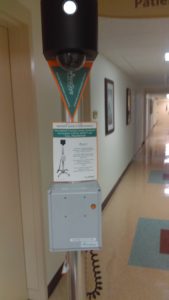Photos:
Left: Phoebe Putney Health System Nurse Manager April Little answers questions during the hospital’s monthly board meeting.
Right: A direct view of the AVASYS Tele-Sitter Device
(Photos by Walter L. Johnson II)
By Walter L. Johnson II
Nearly 1 million hospitalized patients in the U.S. fall during their hospital stay each year, with a third of those incidents ending in injuries.
Locally, Phoebe Putney Health System is taking steps to significantly reduce the number of such falls with the new AVASYS Tele-Sitter Program, which was introduced in January.
The AVASYS program is a versatile device that can be moved from one room to another in helping to prevent such falls from occurring, nurse manager April Little said.
“(AVASYS) is a tele-sitter program, (it’s) a mobile device that we can place in any room, where a patient may be at (a) high risk for falls, or if they may be at risk for pulling out a tube or a line,” said Little. “We’re able to put the device in the room, and re-direct the patients if they start to get (out) of bed, or pull that line or tube.”
Little added: “If they start to (pull out a line or tube), and we know (that) we actually don’t have enough time to tell the nursing staff, then we’ll do a “stat alarm”. The stat alarm will sound, and the nursing staff will come in immediately to help that patient.”
In addition to the AVASYS system, the Phoebe nursing staff uses additional measures to prevent falls, including the use of non-skid socks worn by patients, Little says.
“We actually assess our patients, and then we have universal precautions (that) we go through with every patient, explained Little. “They have an armband, they have non-skid socks on, and (the) AVASYS (system) is just another layer.
“We have bed alarms, where bed alarms are needed. Again, the AVASYS system is just an additional layer, nothing is taken away, it’s just another layer of protection.”
The AVASYS also has live streaming video to monitor patients 24 hours a day, seven days a week. Despite that capability, it can’t record video.
“When we come in with a camera, we educate the patients (that) nothing is being recorded, (the video) is live stream only. So we’re able to document against what we see, but nothing is being recorded and kept,” Little said.
More Information: AvaSure
Further Reading: Fast Facts On Tele-Sitting (avasure.com)
Follow the Southwest Georgia Network on Twitter @swganetwork.


